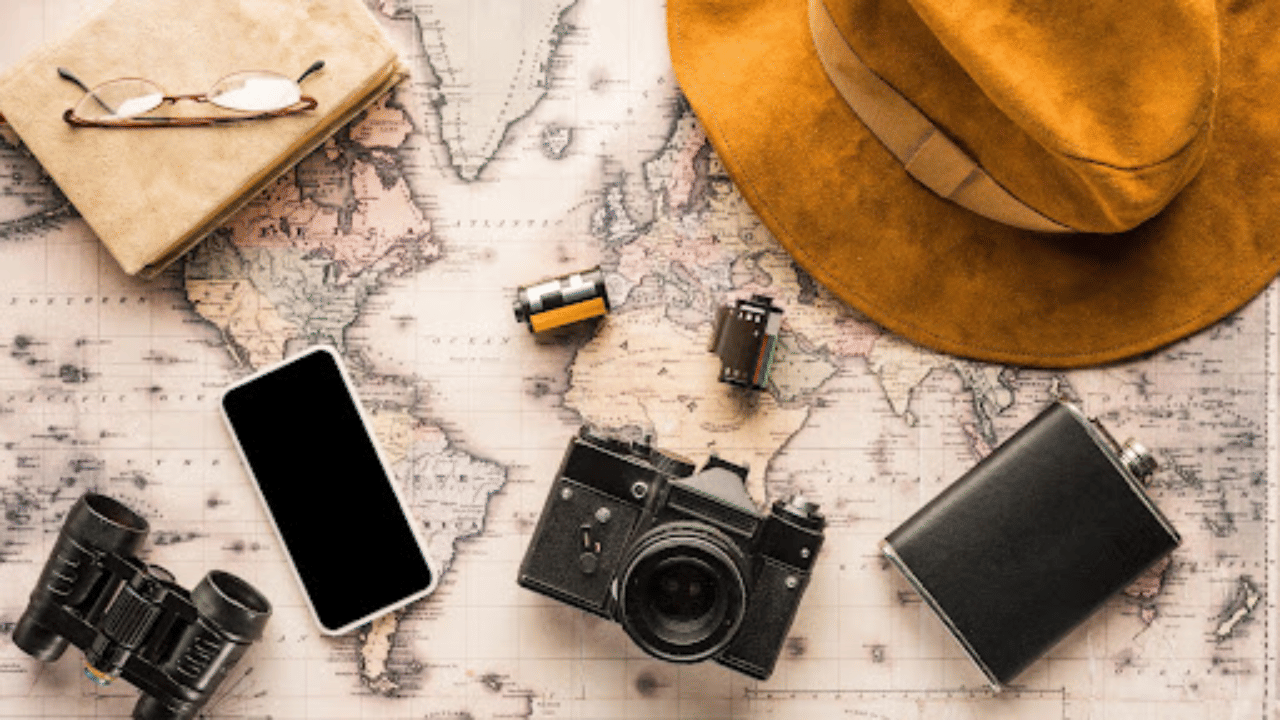Studying abroad is an exciting adventure filled with new experiences, but packing for it can feel overwhelming. What to carry when travelling abroad? What’s essential, and what can stay behind? Smart packing ensures a smooth transition, and this blog breaks down everything you need to take for a hassle-free study abroad experience.
The Ultimate Packing List
1. Essential Documents
A folder containing all of your essential documents is the most important part of your travel checklist. These are the documents that hold the key to your study-abroad experience. The below list will be needed for check-ins, passing your immigration, boarding and undergoing pre-flight formalities.
- Credit Cards: For financial transactions and emergencies.
- Travel Itinerary: To keep track of your travel plans and schedules.
- Boarding Pass: Required for boarding your flight.
- Student Card: For identification and access to student-related services.
- Health Insurance Card or Copy of Travel Health Insurance: Important for medical emergencies.
- Fee Receipt for Accommodation Allotted: Proof of your housing arrangements.
2. Clothing Essentials
Versatility and comfort are very important when you’re packing your bag. Consider the climate and cultural norms of your destination. You don’t want to overpack and then face the hassle of carrying extra weight throughout your journey. Be mindful and pre-plan your outfits well-in advance. In a nutshell, this is what you should carry:
- Tops: Carry a mix of short-sleeve and long-sleeve shirts that can be layered.
- Bottoms: Pack two or three pairs of jeans or trousers, along with a skirt or shorts, depending on the climate.
- Outerwear: A foldable waterproof jacket, or a handy umbrella are great picks if you’re heading to a rainy destination.
- Footwear: A good pair of hiking shoes is a must; add sandals or dress shoes for formal occasions.
- Accessories: Scarves, hats, and belts can enhance outfits without taking up much space.
2. Toiletries
Firstly, consider investing in a good toiletry bag that can hold maximum products without the tension of spillage. Compartmentalise your essentials as per the space provided in the bag. Here’s a list of what toiletries to carry when travelling abroad:
- Travel-sized shampoo and conditioner
- Toothbrush and toothpaste
- Deodorant
- Skincare products (moisturiser, sunscreen)
- Hand towels, napkins
- Sanitary napkins
- Odor Shield
- Contacts
- Wet Wipes
- Disinfectant spray
3. Medicines
If you are undergoing any medical treatment, ensure you carry an adequate supply of your prescribed medication for the duration of your stay. It is equally important to bring the doctor’s prescription, which can be useful in case you run out of doses or need to purchase additional medicine abroad.
Additionally, always have these medicines on you:
- Paracetamol
- Antacids
- Painkillers
- Anti-allergies
- Antiseptic
- Bandages
- Cough syrup
- Dettol
4. Electronics
No student has ever survived university life without having their mobile phones on them. Connectivity is one such essential tool, that makes being on top of your studies, being in touch back home and living the best life possible.
- Laptop/Tablet: Essential for studying and staying in touch with family.
- Smartphone: Don’t forget chargers and any necessary adapters.
- Power Bank: Useful for keeping devices charged while on the go.
- Universal Travel Adapter: Ensure compatibility with outlets in your host country.
5. Study Supplies
Travelling abroad for studies naturally means carrying a few recommended books for your semester. But when you’re backpacking from your destination to head for a trip, the following study supplies can come in handy when you want to get some learning in too:
- Notebooks or journals
- Pens, pencils, highlighters
- Any textbooks required for your courses
- A sturdy backpack for daily use
6. Local currency
Having the local currency of your destination readily available while traveling is crucial. It’s easy to obtain local currency from foreign exchange centers, airport kiosks, and currency exchange offices, which helps you avoid issues with counterfeit money. Familiarize yourself with the basics of the country’s currency to gain a better understanding. Make sure to carry enough cash to conveniently cover essential expenses during your travels.
PS: While Mastercard, Visa and American Express cards are accepted, carrying cash with you is highly recommended.
7. Miscellaneous Items
The list of what to carry when travelling abroad cannot be complete without some miscellaneous items which could prove extremely useful.
- Reusable water bottle
- Snacks from home (especially if you have dietary restrictions)
- Travel pillow for long flights or train rides
- A few mints for fresh breathe
- Wristwatch
- Sleeping bag
- Essential jewellery
- Purse/Wallet
- Sunglasses
- Bedsheets and a Blanket to go with
Steps to Pack Efficiently for Your Study Abroad Trip
Step 1: Select Your Luggage
When flying internationally, you are typically allowed 23kg for checked luggage. Therefore, choosing a spacious and versatile bag that can hold all your essentials is important. A four-wheel, 360-degree rotating suitcase is a great option, as it helps distribute weight evenly and reduces strain on your hands.
Step 2: Organise Before You Pack
Prepare a detailed checklist to ensure you don’t forget anything important. Since returning home frequently isn’t an option—except for semester breaks or emergencies—careful planning and packing before departure are essential.Here are some key points to consider while preparing your packing list:
- Use an online file storage service (like Google Drive or OneDrive) to keep all your documents.
- Arrange airport transfers ahead of time.
- Book temporary accommodation in advance.
- Verify luggage weight restrictions.
- Check which items are prohibited from being carried.
- Attach a luggage tag to identify your bag and avoid confusion with others easily.
- Upload photos of all important documents for easy access.
- Find a suitable space to organize all your essentials before packing.
- Regularly check off items from your list as you pack.
Step 3: Differentiate Between Checked and Carry-On Luggage
It’s essential to understand the distinction between items for checked luggage and carry-on items. Certain items cannot be placed in checked baggage, so it’s essential to read the baggage restrictions carefully to avoid any issues.
For carry-on luggage, Indian students traveling abroad should include the following items:
- Currency of the host country
- Important documents
- Phone, charger, and other electronic devices
- Prescription medications
All other items should be packed in your checked baggage.
Things Not to Carry While Traveling Abroad
Airlines have specific rules regarding what items can be included in both checked and carry-on luggage. Additionally, many countries have restrictions on certain products. To ensure a hassle-free travel experience, there are several items you should avoid bringing when traveling abroad. Here’s a list of things to leave behind:
- Heavy Bottles of Liquid: Liquids are generally not permitted on flights. If you want to stay hydrated during your journey, opt for small water bottles or purchase drinks at the airport. Large containers of oil, beverages, sanitizers, or shampoo are prohibited.
- Books: Books can significantly increase the weight of your luggage, so it’s best to leave them at home. They are readily available at college libraries or can be purchased locally. Instead, use that space for more essential items.
- Snacks: Snacks can take up valuable space in your luggage. Consider trying the local cuisine of your host country instead of bringing food from home. Sampling local dishes will help you acclimate to the new culture.
- Expensive Jewellery: While phones and laptops are necessary for travel, it’s advisable to avoid bringing expensive jewelry. Students traveling abroad should refrain from carrying costly items to reduce the risk of loss or theft.
Less is More: Strategies to Pack Efficiently
- Pack in Advance: Begin planning and setting aside the items you’ll need beforehand. This approach will make identifying what is essential and what can be left behind easier.
- Conduct Research: To prevent overpacking, reach out to other Indian students already studying abroad. They can provide valuable insights and advice on what items are suitable for your host country.
- Eliminate Unnecessary Items: Avoid packing heavy items that may not be essential. Instead, create a list of necessary items and stick to it to ensure you only bring what you truly need.
Tips for Efficient Packing
Packing efficiently not only saves space but also ensures you carry everything you need without overloading your luggage. Here are some impactful tips to make packing smarter and stress-free:
- Use Packing Cubes: Organize your clothing into categories and maximize suitcase space with these handy organizers. They also make unpacking easier upon arrival.
- Roll Your Clothes: Rolling clothes instead of folding them reduces wrinkles, saves space, and makes it easier to fit more items in your luggage.
- Wear Bulky Items During Travel: Save precious suitcase space by wearing heavy jackets, boots, or sweaters while traveling. This trick is especially useful for winter destinations.
- Utilise Shoe Space: Store small items like socks, chargers, or toiletries inside shoes to make use of every inch of your luggage.
- Plan Versatile Outfits: Pack clothing that can be mixed and matched to create multiple outfits with fewer items. This minimizes the need for excess clothing while keeping you stylish.
- Leverage Local Resources: Many accommodations abroad provide essentials like linens, bedsheets, blankets, and cushions. Check ahead and avoid packing these bulky items unnecessarily.
Final Checklist Before Departure
- Verify your passport’s expiry date
- Get a local contact number for your new country
- Set up a dedicated email address
- Keep photocopies of all essential documents
- Stay in touch with your educational institution
- Charge all your devices—phone, camera, and laptop
Packing for study abroad doesn’t have to be a challenge. You can ensure a smooth and stress-free transition by carefully selecting what to carry when travelling abroad and staying organised. Focus on essentials that add value—whether for daily use, academics, or comfort.
Opting for well-equipped accommodation with UniAcco, can also lighten your load by covering many necessities, allowing you to pack smarter and travel with ease.
FAQs
1. How do I choose a backpack for international students?
When choosing a backpack for studying abroad, consider the following factors:
- Size and Capacity: Ensure it has enough space to hold your laptop, textbooks, and personal items without being overly bulky.
- Comfort and Support: Look for padded shoulder straps and a supportive back panel to ensure comfort during long commutes.
- Durability and Weather Resistance: Choose durable and water-resistant materials to protect your belongings from the elements.
2. What should you buy before studying abroad?
Before studying abroad, essential items to buy include power adapters, travel-sized toiletries, comfortable walking shoes, prescription medications, and business casual outfits for internships or formal events.
3. What are the essentials I need to pack for my trip abroad?
When packing for your trip abroad, essential items include:
- Travel Documents: Passport, visas, and travel insurance.
- Clothing: Versatile outfits suitable for the climate and activities.
- Toiletries: Travel-sized personal care items and medications.
- Electronics: Chargers, adapters, and a smartphone or laptop.
- Miscellaneous: A reusable water bottle, snacks, and a first aid kit.
4. What should I not pack to study abroad?
Avoid packing unnecessary items like excessive clothing, valuable jewellery, large toiletries, and anything that can be easily purchased at your destination. Additionally, steer clear of heavy books or items that may violate local customs or regulations.
5. How should I make sure I’ve covered everything to carry?
To ensure you’ve covered everything for your trip, create a comprehensive packing list well in advance, categorising items into essentials, clothing, toiletries, and electronics. Review the list multiple times and check off items as you pack. Finally, do a final walkthrough of your packing area to double-check that nothing is overlooked.
This guide should give you a clear picture of what you should pack and how to go about it in an orderly manner. If you wish to read more such articles, we recommend you read our blogs below:















0 Comments